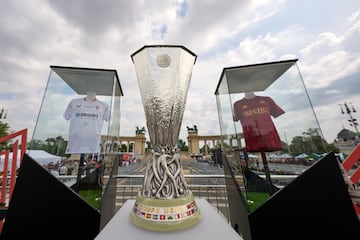What happens if the two teams tie in the Europa League final?
Sevilla will be looking for a record seventh title and Roma, their first. We look at what happens if there is no clear winner on 90 minutes.

Sevilla and Roma go head-to head later this evening at Budapest’s Puskás Arena in the 2023 Europa League final. The Spanish club will be aiming to lift the trophy for a seventh time while Roma are seeking their first title. The Italians came close to winning the tournament, then called the UEFA Cup, in 1990/1 only to lose 2-1 on aggregate to compatriots Inter. Back then, the final was played over two legs, home and away - that has changed, since 1998 the final has been played as a single game played at a neutral, predetermined venue.
The old away goals rule also no longer applies, so tonight there will be one winner, with no aggregate score and no away goals to tot up. Apart from adding another piece of silverware to their trophy cabinets, there will be an extra incentive for Sevilla and Roma in Budapest this evening as the winners will automatically qualify for next season’s Champions League.

Are there extra-time and penalties in the Europa League final?
Since the single-match format was introduced in 1998, nine finals have ended level after 90 minutes plus stoppage time. Out of those, three were decided in extra-time five from the penalty spot after 120 minutes, and one, famously with a Golden Goal - the nine-goal rollercoaster between Liverpool and Alavés in 2001, which after much toing and froing, was poised at 4-4 with four minutes of extra-time to play and seemingly destined to go on forever. It was one of the last occasions when a match was settled by a golden goal before the rule was abolished for FIFA and UEFA-organised tournaments in 2004.
How does extra-time work in the Europa League final?
If tonight’s final ends level with both teams tied after the full 90 minutes plus whatever stoppage time match official Anthony Taylor deems fit to add on, two 15-minute periods of extra-time will be played with a brief, half-time interval between each half. If one of the team scores more goals than the other team during the 30 minutes of extra time, they will be declared the winners. For example, if the final ends 1-1 on 90 minutes and Roma is the only team to score in extra-time, they will lift the trophy and vice versa.
What happens if the final is still tied after extra-time? What is the penalty shoot-out procedure?
If the score is still level after extra-time, the winner will be determined via a penalty shoot-out, in accordance with IFAB Laws of the Game.
Both teams will take a minimum of five penalties each in a best-of-five series. The referee will toss a coin to determine the goal where the kicks will be taken. A second toss of the coin will decide which team takes the first kick and who will go second.
Each captain is responsible for selecting the first five players who will take the kicks and the order in which they take them.
The penalty taker and both goalkeepers are the only ones allowed to remain near the goal area, all other players must remain in the centre-circle or behind the halfway line.
The penalties are taken alternately by each time until both have taken five kicks - or until it is no longer possible for one of the teams to win the best of five series (eg. if one team converts their first three penalties and the other misses their three, the shoot-out is technically over).
If, after both teams have taken five kicks, the scores are still level, the shootout will enter sudden death - ie. both teams will continue taking one penalty each until someone misses or their shot is saved. The winner will be the to one who has scored the most goals from the same number of kicks.






